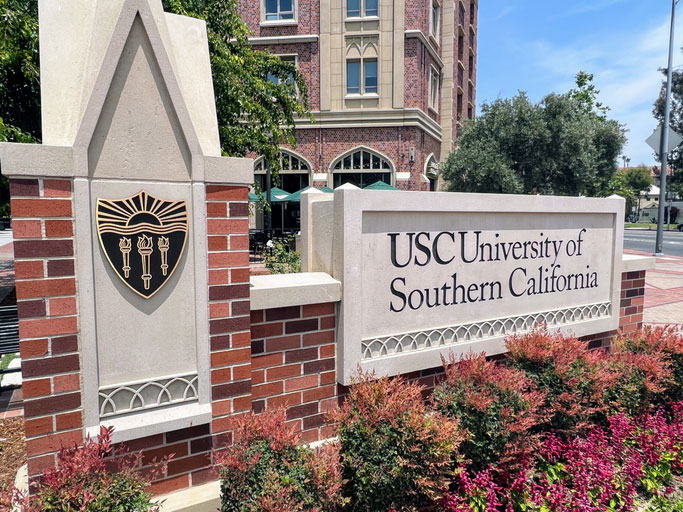Written by Helen Lewis
The following article explores the qualification of DNP (Doctor of Nursing Practice), an advanced-level degree that enables trained nurses to pursue senior-level roles, responsibilities, and salaries.
On average, a DNP can expect to earn around $158,130 per year, making California one of the highest-paying states for DNPs.
Below, you’ll find an overview of some of the key factors of pursuing work as a DNP in the Golden State, ranging from degree-granting DNP programs in California, ranked from the costliest to the cheapest; the difference between a DNP, an RN, and an MD; and the salary range for qualified DNPs in California.
What Is A DNP?
A Doctor of Nursing Practice (DNP) is the highest level of qualification in practical nursing.
In this field, nurses are equipped with senior-level skills in clinical practice and leadership. DNPs are primarily focused on applying their skills directly with patients in healthcare settings. By contrast, nurses with PhDs in nursing tend to apply their skills in research and educational settings.
That doesn’t mean that DNPs don’t conduct or apply research: in fact, DNPs are often well versed in the latest medical research, and the process of pursuing a DNP degree often concludes with candidates completing in-depth projects that combine academic research and medical practice with patients.
The Best DNP Programs in California, from On-Campus to Online

If you’re considering pursuing a Doctor of Nursing Practice (DNP) degree in California, there are several options available that vary in cost, format, and specializations. From the University of San Diego’s high-cost hybrid program to more affordable state university options, you’ll find a range of opportunities tailored to fit different needs.
Programs like those at the University of San Francisco and Point Loma Nazarene University offer hybrid or primarily online formats, while California State University, Long Beach, and the University of California, San Francisco provide comprehensive in-person or hybrid experiences.
Here’s a closer look at some of these programs, organized from the most to the least expensive options.
University of Southern California (USC)
USC provides a hybrid DNP program designed for working nurses. Tuition is around $1,995 per unit. The program emphasizes clinical practice, leadership, and healthcare innovation, integrating online coursework with periodic on-campus intensives. Students complete clinical hours and a scholarly project to translate evidence-based research into practice.
University of San Diego (USD)
The University of San Diego offers a Doctor of Nursing Practice (DNP) program that is primarily hybrid, blending online coursework with on-campus intensives. The program covers various specializations, including Nurse Anesthesia and Family Nurse Practitioner. Tuition is approximately $1,535 per unit, making it one of the more expensive programs in the Golden State. USD emphasizes advanced practice, leadership, and clinical skills, culminating in a doctoral project designed to address real-world healthcare issues.
University of San Francisco (USF)
USF’s DNP program is another high-cost option, with tuition around $1,480 per unit. The program is hybrid, combining online and on-campus classes, and offers specializations like Family Nurse Practitioner and Psychiatric Mental Health Nurse Practitioner. The curriculum focuses on interprofessional collaboration, leadership, and advanced clinical practice.
Azusa Pacific University (APU)
APU offers an online DNP program with minimal on-campus residency requirements. Tuition is approximately $1,560 per unit. The program focuses on advanced practice skills, organizational leadership, and evidence-based practice, preparing graduates for leadership roles in healthcare. APU is military-friendly, and offers support to veterans who are hoping to transition into degree programs through specific pathways.
Point Loma Nazarene University (PLNU)
PLNU offers a DNP program that is primarily online, with tuition costing approximately $1,000 per unit. The program includes asynchronous online learning with two in-person intensive weekends. Specializations include Clinical Nurse Specialist and Family Nurse Practitioner. Students must complete 1,000 clinical hours, including a significant DNP project.
California State University, Long Beach (CSULB)
CSULB’s DNP program, which costs around $17,000 per year for in-state students, is primarily in-person. The program offers various tracks, such as Nurse Practitioner and Clinical Nurse Specialist. The curriculum includes advanced clinical practice, leadership training, and healthcare policy, and requires students to complete a doctoral project and extensive clinical practice.
University of California, San Francisco (UCSF)
UCSF offers a hybrid DNP program with tuition around $12,000 per quarter. The program includes a mix of in-person and online courses, with hands-on training at renowned hospitals and clinics in the San Francisco Bay Area. Specializations include Adult-Gerontology Acute Care, Family Nurse Practitioner, and Psychiatric Mental Health, among others. The program prepares nurses for advanced practice and leadership roles in healthcare.
University of California, Los Angeles (UCLA)
UCLA offers a hybrid DNP program that combines online coursework with on-campus sessions. Tuition is approximately $22,500 per year. This program focuses on translating research into clinical practice, leadership, and health policy. The flexible format allows working professionals to continue their employment while completing the degree in less than two years.
Loma Linda University (LLU)
LLU’s hybrid DNP program includes both online coursework and quarterly on-campus sessions. Tuition is about $1,200 per unit. The program offers various specializations, including Family Nurse Practitioner and Nurse Anesthesia, emphasizing interprofessional collaboration and clinical excellence.
Samuel Merritt University (SMU)
SMU provides a hybrid DNP program with online courses and occasional on-campus requirements in Oakland or Sacramento. Tuition is around $1,050 per unit. The program offers tracks for Family Nurse Practitioner and Post-Master’s DNP, focusing on clinical practice, leadership, and healthcare innovation.
California Baptist University (CBU)
CBU offers a primarily online DNP program with some on-campus residencies in Riverside. Tuition is approximately $950 per unit. The program emphasizes systems leadership and evidence-based practice, preparing advanced practice nurses for executive roles in healthcare.
Fresno State University
Fresno State’s DNP program is campus-based with a tuition cost of about $12,000 per year for in-state students. The program focuses on advanced clinical practice, leadership, and healthcare policy, with extensive clinical training at various healthcare facilities.
These programs offer a range of formats and specializations to suit different professional and personal needs, providing pathways to advanced practice and leadership roles in nursing.
Do I Need a DNP Degree to Become A Nurse?
You do not need a DNP degree to become a nurse in California.
In fact, you can start your nursing career with an Associate Degree in Nursing (ADN) or a Bachelor of Science in Nursing (BSN).
As an RN, you’ll still be able to provide critical services to patients, like inserting and managing IV lines to drawing blood, educating patients about their health conditions and treatment plans, helping patients with physical therapy exercises, managing urinary catheters and performing catheterizations, monitoring vital signs (like heart rate, temperature, and blood pressure), and dressing wounds.
A DNP is more for those who want to climb the nursing ladder into advanced practice roles, like nurse practitioners, nurse anesthetists, or clinical nurse specialists. It’s also great if you’re eyeing leadership positions or want to dive deeper into clinical practice.
For more detailed information about getting your license as any type of nurse, the California Board of Registered Nursing website provides in-depth overviews regarding licensing, enforcement, and intervention.
What’s The Difference Between a DNP and an RN?
The main difference between RNs (Registered Nurses) and DNPs (Doctors of Nursing Practice) lies in their roles, responsibilities, and level of education.
RNs typically hold an ADN or BSN and are essential for providing direct patient care, administering medications, performing diagnostic tests, and educating patients about their health. They are the backbone of day-to-day healthcare operations and work under the supervision of physicians and advanced practice nurses. (For more on what RNs do, see the above section, “Do I Need a DNP to Become A Nurse in California?”.)
On the other hand, DNPs have advanced degrees that prepare them for higher-level roles in clinical practice, leadership, and healthcare policy. That can look like mentoring and educating nursing staff, prescribing medications and therapies, performing more advanced procedures (like anesthesia, minor surgical procedures, and advanced wound care), providing expert consultations, managing budgets and resources, and serving as a faculty member in nursing education programs.

What’s the Difference Between a DNP and an MD?
In California, a Doctor of Nursing Practice (DNP) can technically be referred to as “doctor” due to their doctoral-level education – but that doesn’t legally mean that DNPs are medical doctors (MDs).
In fact, state laws in California actually impose restrictions on this usage in clinical settings to prevent confusion among patients who might mistake a DNP for an MD. In general, DNPs are widely prohibited in California from using the title “doctor” in a clinical environment in order to ensure clarity about the provider’s qualifications and role for patients.
Despite these restrictions, some DNPs have challenged the law, arguing that their advanced level of education and expertise warrants the use of the title “doctor.” Some believe that allowing DNPs to use the title can enhance patient trust and recognition of their qualifications, while others argue that it can lead to confusion and misrepresentation.
How Much Does A DNP In California Earn?
In California, the average salary for a Doctor of Nursing Practice (DNP) varies significantly based on location and specialization.
For example, DNPs in the San Francisco-Oakland-Hayward area can earn about $150,790 annually, while those in the Vallejo-Fairfield area earn approximately $163,950, the highest in the state. Other high-paying regions include San Jose-Sunnyvale-Santa Clara ($134,700), and Los Angeles-Long Beach-Anaheim ($135,230).
These differences in salary are influenced by the cost of living and demand for healthcare professionals in each region. Urban areas with higher living costs and greater healthcare demands tend to offer higher salaries. For those in specialized roles such as nurse anesthetists or psychiatric nurse practitioners, salaries can be even higher, reflecting the specialized skills and higher demand for these positions.
2023 US Bureau of Labor Statistics salary and employment figures reflect state data, not school-specific information. Conditions in your area may vary. Data accessed September 2024.

